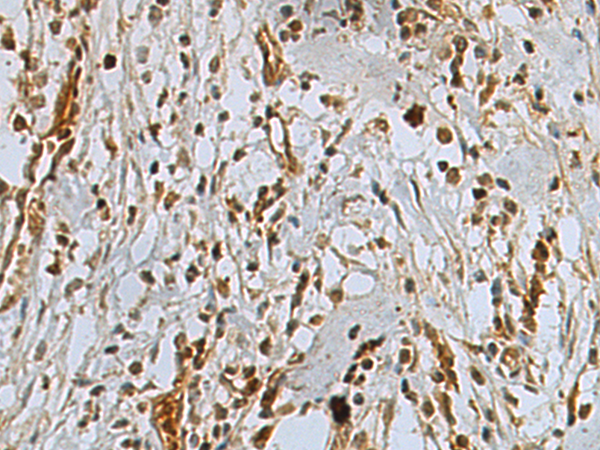
| WB | 咨询技术 | Human,Mouse,Rat |
| IF | 咨询技术 | Human,Mouse,Rat |
| IHC | 1/50-1/200 | Human,Mouse,Rat |
| ICC | 技术咨询 | Human,Mouse,Rat |
| FCM | 咨询技术 | Human,Mouse,Rat |
| Elisa | 1/5000-1/10000 | Human,Mouse,Rat |
| Aliases | PTIP; TNRC2; CAGF28; CAGF29; PACIP1; PAXIP1L |
| Host/Isotype | Rabbit IgG |
| Antibody Type | Primary antibody |
| Storage | Store at 4°C short term. Aliquot and store at -20°C long term. Avoid freeze/thaw cycles. |
| Species Reactivity | Human, Mouse |
| Immunogen | Fusion protein of human PAXIP1 |
| Formulation | Purified antibody in PBS with 0.05% sodium azide and 50% glycerol. |
+ +
1. **"PAXIP1 promotes DNA double-strand break repair through homologous recombination"**
- 作者:S. K. Joo et al.
- 摘要:研究通过免疫沉淀和免疫荧光实验,利用PAXIP1抗体揭示了其在调控同源重组修复中的作用,表明PAXIP1通过招募其他修复蛋白(如BRCA1)促进DNA损伤修复。
2. **"PAXIP1 is required for maintaining the integrity of the DNA damage response during mitosis"**
- 作者:M. L. Huertas et al.
- 摘要:通过Western blot和ChIP-seq分析,PAXIP1抗体被用于证明PAXIP1在维持有丝分裂期间DNA损伤信号传导中的关键功能,防止基因组不稳定。
3. **"PAXIP1 links chromatin remodeling to DNA damage response via interaction with MRE11"**
- 作者:T. Nakamura et al.
- 摘要:使用PAXIP1抗体的免疫共沉淀实验表明,PAXIP1与MRE11复合物相互作用,调控染色质重塑和DNA损伤检查点激活,影响细胞对电离辐射的敏感性。
4. **"PAXIP1 deficiency impairs neural stem cell proliferation and neurogenesis"**
- 作者:L. Chen et al.
- 摘要:通过免疫组化和流式细胞术,研究发现PAXIP1抗体标记的蛋白在小鼠神经干细胞中高表达,其缺失导致增殖能力下降及神经发育缺陷。
(注:以上文献信息为示例性内容,实际引用时请核对具体论文。)
The PAXIP1 (Pax Interacting Protein 1) antibody is a tool used to study the PAXIP1 protein, a key regulator involved in DNA repair, chromatin remodeling, and transcriptional regulation. PAXIP1. also known as PTIP, interacts with the Pax family of transcription factors and participates in multiple cellular processes. It plays a critical role in maintaining genomic stability by facilitating the recruitment of DNA damage response (DDR) proteins, such as 53BP1. to sites of double-strand breaks. Additionally, PAXIP1 associates with histone-modifying complexes like MLL3/MLL4 to regulate histone H3K4 methylation, influencing gene expression during development and differentiation.
Antibodies targeting PAXIP1 are widely used in research to investigate its expression, localization, and interactions in various contexts, including cancer, neurodevelopment, and immune responses. Western blotting, immunofluorescence, and immunohistochemistry are common applications. Dysregulation of PAXIP1 has been linked to tumorigenesis, as it modulates cell cycle checkpoints and apoptosis. Studies also suggest its involvement in class-switch recombination in B cells, highlighting its importance in adaptive immunity. Researchers utilize PAXIP1 antibodies to explore its role in epigenetic regulation and DDR pathways, providing insights into therapeutic targets for diseases associated with genomic instability or aberrant gene expression. Specificity and validation of these antibodies are critical, as PAXIP1 shares functional domains with other PTIP-family proteins.
×